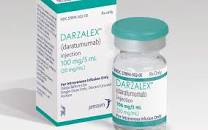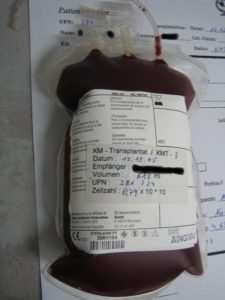
Recently Diagnosed or Relapsed? Stop Looking For a Miracle Cure, and Use Evidence-Based Therapies To Enhance Your Treatment and Prolong Your Remission
Multiple Myeloma an incurable disease, but I have spent the last 25 years in remission using a blend of conventional oncology and evidence-based nutrition, supplementation, and lifestyle therapies from peer-reviewed studies that your oncologist probably hasn't told you about.
Click the orange button to the right to learn more about what you can start doing today.
- You are here:
- Home »
- Blog »
- Multiple Myeloma »
- Multiple Myeloma Chemotherapy- Daratumumab Increases Risk of Listeria
Multiple Myeloma Chemotherapy- Daratumumab Increases Risk of Listeria

“patients with multiple myeloma receiving daratumumab (darzelex) had a 75-fold increased risk for listeria compared with other patients with myeloma.”
It shouldn’t come as a surprise to anyone that multiple myeloma chemotherapy lowers the patient’s immune system. And a lowered immune system makes the patient more susceptible to food-borne illnesses like listeria.
MM patients have to be aware that certain multiple myeloma chemotherapy regimens are cardiotoxic aka damage the heart. MM patients must be aware that certain multiple myeloma chemotherapy regimens cause kidney damage.
MM patients must be aware of the most serious side effects of whatever chemo, or combination of chemotherapy regimens, they are taking in order to prepare for the damage.
MM patients who undergo an autologous stem cell transplant (ASCT) face a lifetime of long-term and late stage side effects. Stem cell transplant patients are extremely susceptible to infection. Patients either stay in their hospital room for the duration or they wear a mask if they go outside and are really, really careful about getting infections.
The question is if Daratumumab, as a MM chemotherapy, is any worse, causes more infections than any other MM chemotherapy. The answer is yes, according to research, Daratumumab can make the patient susceptible to viruses.
The next question then, is this increased risk of infection caused by Daratumumab, worth it?
Have you been diagnosed with multiple myeloma? If so, what stage? What symptoms? To learn more about evidence-based, non-toxic therapies shown to reduce the risk of
- infection
- heart damage
- kidney damage,
and more, scroll down the page, post a question or comment and I will reply to you ASAP.
Hang in there,
David Emerson
- MM Survivor
- MM Coach
- Director PeopleBeatingCancer
Recommended Reading:
- Myeloma Diagnosis- Pathology-Oncology Dysfunction- Get A Second Opinion
- Multiple Myeloma Treatment- Medical Health Care Records are KEY!
- Has a Multiple Myeloma Patient Ever Died In Clinical Trial?
Daratumumab Increased Myeloma Patient Risk for Listeria
“Patients with multiple myeloma being treated with daratumumab appeared to be at greater risk for Listeria compared with other patients with cancer and other patients with myeloma, according to a recent study.
Preclinical studies had shown that inactivation of CD28 – the mechanism of action for daratumumab – caused an increased susceptibility to Listeria monocytogenes in CD38 knockout mice.
This nested case-control study looked at risk for L monocytogenes among all patients that received daratumumab amid an outbreak at a commercial eatery in a tertiary cancer center in Toronto, Canada, over a 9-month period in 2018. The cancer center serves 284,500 outpatient visits per year.
Of the 7 patients identified with listeriosis, more than half had myeloma. All of the identified patients had cancer, 57% had myeloma, and 43% were receiving daratumumab…
After adjustment for hospital visits, patients with myeloma had a 340-fold increased risk for listeriosis compared with other patients with cancer. Specifically, patients with myeloma receiving daratumumab had a 75-fold increased risk for listeriosis compared with other patients with myeloma.
“We suggest that patients receiving daratumumab be provided with dietary advice to avoid unpasteurized dairy products, undercooked meats, or unwashed vegetables,” the researchers wrote. “Antibiotic prophylaxis should be considered using sulfa-methoxazole/trimethoprim, which has activity against Listeria and is routinely indicated for pneumocystis pneumonia prophylaxis with corticosteroid use.”
Infection Risk Associated with Daratumumab
“Background Daratumumab is an IgG kappa monoclonal antibody (mAB) against CD38 which is expressed on myeloma cells. It has recently been approved for treatment of patients with relapsed refractory multiple myeloma…
For each group, we evaluated the incidence of infection, neutropenia (defined as ANC <1,000), hospitalization, and 90-day survival…
Median age was 68 years. A total of 151 infections occurred in 121 of the 343 cycles (40% bacterial; 52% viral).
There was a significant association between development of infection and chemotherapy regimen used (χ² = 17, P ≤ 0.001).
Patients developed neutropenia in 129 of 254 cycles (51%). There was a significant association between the development of neutropenia and chemotherapy regimen used (χ² = 43.51, P < 0.00001). Discontinuation of chemotherapy occurred in 65 cycles (19%), mainly due to progression of disease (54%).
Eighty subjects (23%) required hospitalization, infection being the main cause (51%). Ninety-day survival was 91.8%.
Conclusion Infection is common among myeloma patients who receive daratumumab. Myeloma patients who receive daratumumab in conjunction with multidrug chemotherapy regimens have an increased risk of infection and neutropenia. Because daratumumab is given predominantly as outpatient therapy, a greater understanding of the potential immunomodulatory effects of daratumumab will lead to increased vigilance in identifying and treating clinically significant infections. Disclosures F. Davies, Janssen: Consultant, Speaker honorarium. G. Morgan, Janssen: Consultant and Research Contractor, Research support and Speaker honorarium.


